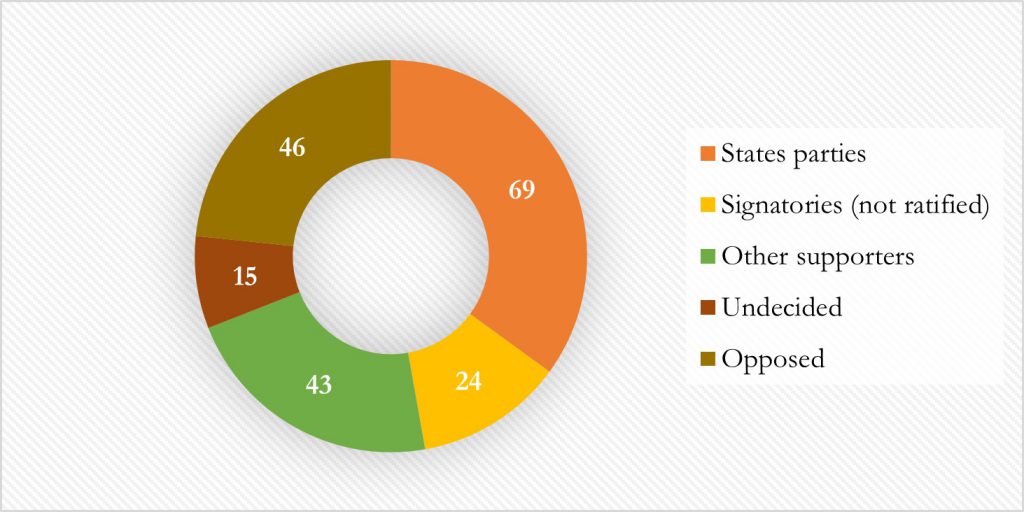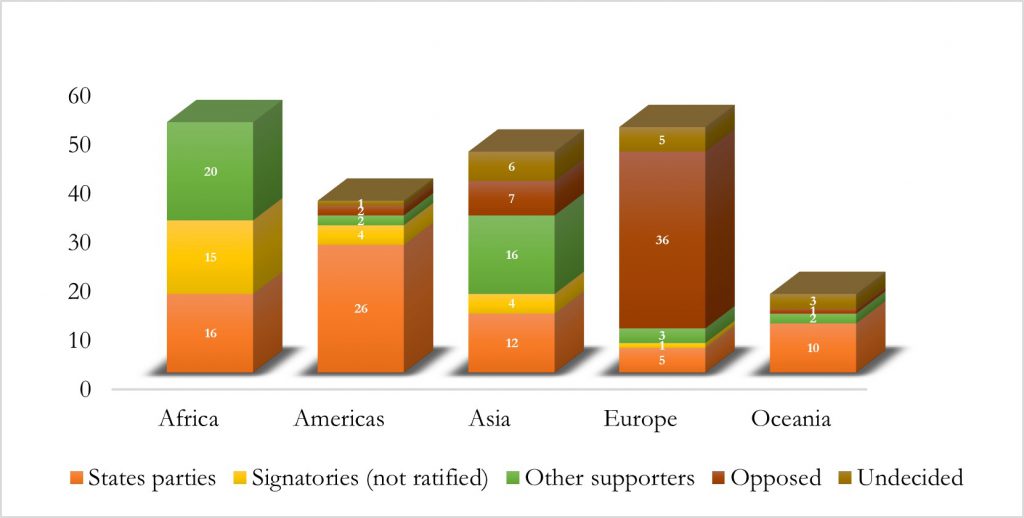Countries of the Global South are the primary advocates of the Treaty on the Prohibition of Nuclear Weapons (TPNW). Mahmoud Javadi argues that the TPNW can help gauge the authenticity, sincerity, and seriousness of major Western and Eastern powers in their geopolitical engagement with these countries
In the face of staunch opposition from nuclear-armed states and the majority of their allies, and against all expectations, the TPNW came into effect on 22 January 2021. Since then, two States Parties Meetings have taken place, the second convened in New York from 27 November — 1 December 2023.
The Treaty enjoys widespread support from countries around the world. Notably, the majority of states in the so-called Global South are signatories. This signifies their commitment to shaping their national defence strategies and their vision for the global security order solely through non-nuclear avenues.
The Treaty on the Prohibition of Nuclear Weapons is a litmus test for nuclear powers' sincerity in heeding the Global South's ‘no-nuclear-weapons’ vision for international security
Nuclear powers and their beneficiary states — umbrella states — often emphasise the Global South's pivotal role in redefining and reshaping the international order. In this context, the Treaty is a litmus test for nuclear powers' sincerity in heeding the Global South's ‘no-nuclear-weapons’ vision for the international (security) order.
As of December 2023, 93 countries have signed the Treaty. A further 69 countries have ratified it. Additionally, 43 states, which have neither been party to nor signed the Treaty, are considered TPNW supporters because they voted in favour of its adoption in 2017. Therefore, 136 out of 197 world states endorse the Treaty in various ways. This accounts for almost 70% of all UN member states / observers.
Among the remaining 61 states, 15 (8% of the global total) remain undecided. In the 2017 vote for the Treaty’s adoption, they either abstained or did not participate. All nine nuclear-armed states — the United States, United Kingdom, France, Russia, China, India, Pakistan, North Korea, and Israel — along with the remaining 37 allied states of the United States have, since its adoption, consistently opposed the TPNW.

There is widespread support for the Treaty across all non-European regions of the world. Every state in Africa has now officially backed the Treaty, either as states parties or signatories, or as other supporters. In Europe, by contrast, 36 out of 47 states (76%) expressed opposition to the Treaty.

Pursuit of global nuclear disarmament is a challenging undertaking. Relying on normative pressure through TPNW may not necessarily persuade more states to join. Prior to the Russian invasion of Ukraine in February 2022, opponents of the TPNW argued that the Treaty neglects crucial aspects essential for achieving sustainable global nuclear disarmament. Opponents also argued that the Treaty contradicts, and poses a risk of undermining, Article 6 of the Treaty on the Non-Proliferation of Nuclear Weapons (NPT), which pertains to nuclear disarmament.
Since the Treaty came into effect in 2021, the international world order has been shaken up. War in Ukraine, Belarus hosting Russia’s nuclear weapons, Finland aligning with the NATO nuclear doctrine, Poland expressing intentions to join NATO’s nuclear weapons-sharing programme, and increased public favourability towards the use of nuclear weapons in Europe, all contribute to the perception that universalisation of the TPNW is an elusive goal. In reality, these developments provide TPNW opponents with grounds to legitimise nuclear deterrence as a justifiable security doctrine.
Against these backdrops, the Second Meeting of the States Parties to the TPNW conveyed a resounding message:
We, the States Parties to the TPNW, will not stand by as spectators to increasing nuclear risks and the dangerous perpetuation of nuclear deterrence. We are resolutely committed to the universalization and effective implementation of the Treaty
Second Meeting of States Parties to the TPNW, 1 December 2023
Moreover, in the span from the first to the second Meeting of States Parties (June 2022 – November 2023), seven countries signed the Treaty, four countries completed the ratification process, and one country formally acceded.
The Treaty is attracting increasing support, underscoring the global momentum towards eliminating nuclear weapons. Eventually, this momentum could guide the 82 states that have not yet ratified the Treaty, but also have not opposed it, towards becoming signatories.
Nevertheless, for the foreseeable future, the 46 opposing states, from West and East, will continue to impede the TPNW's universalisation. Their resistance contradicts the Global South's ‘no-nuclear-weapons’ vision. In the aftermath of Russia's invasion of Ukraine, the authentic values and status of this vision have become apparent not only to Western states but also to Eastern nuclear powers, including Russia and China.
Contradicting the Global South's ‘no-nuclear-weapons’ vision, 46 states continue to impede the Treaty on the Prohibition of Nuclear Weapons
Since the outbreak of war in Ukraine, EU High Representative Josep Borrell has reflected Global-South geopolitical salience, warning that 'we must listen carefully to the countries of the South'. Global-South countries are aiming for a more multipolar world in which they can determine their own paths, free from the agendas of major powers. Are Borrell and similar figures truly sincere about heeding them? This will become evident in their support (or not) for their plea to abolish nuclear weapons.
Numerous experts propose strategies to Western governments on how to garner support against Russia and China. But it is crucial to acknowledge that the Southern nations are, primarily, disillusioned with the heightened nuclear risks associated with Russia’s nuclear rhetoric.
The Treaty on the Prohibition of Nuclear Weapons will be a litmus test for nuclear states and their beneficiaries who seek support from the Global South. The Treaty encapsulates the Global South’s vision for the international security order. Unless TPNW opponents align with this vision, securing support from the Global South remains precarious, if not unattainable.